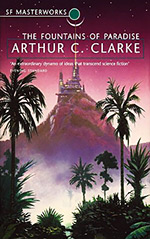
![]() BigEnk
BigEnk
3/31/2025
![]()
There's a sort of false promise that made me interested in this book in the first place. It's marketed as both SF and historical fiction, where Clarke weaves a lot of his knowledge and passion for Sri Lanka into a fictionalized version where he can also play with a lot of his more familiar themes and tropes. To be fair, there is some of that. The first few chapters of The Fountains of Paradise do mix these two genres in a slow but pleasing way. It's discovered that the best/only site for the first space elevator is located at the summit of a mountain that has been occupied by a monastery for thousands of years. Clarke spends some time juxtaposing the struggles of the present day engineer who is the lead designer of the elevator, with the struggles of an ancient king in the area, and his relationship with the same order on the mountain.
In the end though, I'm not really sure if Clarke's intentions are clear. It's as if Clarke himself struggled to fill an entire novel length work with the mixture of historical elements, theology, and science that he initially wanted, and as that structure started to break down he reverted to his tried and true method of describing the creation of a engineering marvel. It's really cut and dry stuff, and I struggling to hold my attention for the duration. I'm probably totally wrong about Clarke's intentions, but I'm certainly not wrong about how the book let me down.
And of course because it's Clarke everything is written with the same intensity and flavor as a bowl of oatmeal. Clarke struggles with creativity, and it's a shame because when he shows some of it (The aliens in Childhood's End or Rama in Rendezvous With Rama) his works are at least a tier higher in quality.